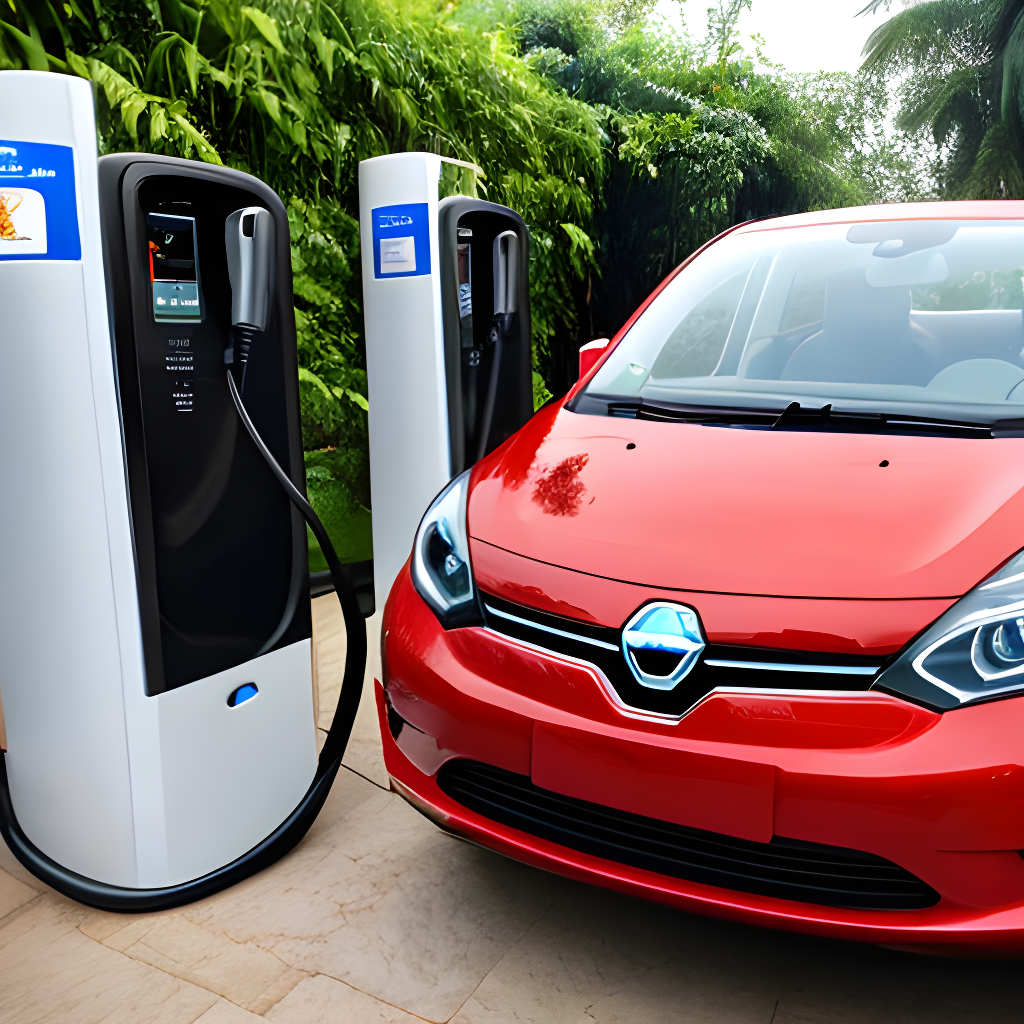India, under the leadership of PM Narendra Modi, has made remarkable strides in transitioning towards renewable energy sources. Through a series of initiatives and policies, the country has achieved significant milestones in renewable energy adoption and sustainability. With a focus on sustainable production and consumption, India has experienced rapid growth in renewable energy capacity, particularly in solar and wind energy.
This article explores the key factors contributing to India’s successful transition towards renewable energy and highlights the government’s efforts in promoting a greener and more sustainable future.
Increasing Farmer Benefits through PM-KUSUM
One of the notable initiatives driving India’s renewable energy transition is the Pradhan Mantri Kisan Urja Suraksha evam Utthan Mahabhiyan (PM-KUSUM), launched in 2019. This ambitious program aims to provide energy security to farmers by offering subsidized solar irrigation pumps, revolutionizing the agricultural landscape of the country.

Through PM-KUSUM, over 21 lakh farmers have already reaped the benefits of this transformative scheme. Under the program, 2.09 lakh agriculture pumps have been solarized, enabling farmers to harness the power of the sun to meet their irrigation needs. By embracing solar energy, farmers have experienced enhanced energy security, reduced reliance on traditional energy sources, and a significant reduction in operating costs.
The impact of PM-KUSUM extends beyond the agricultural sector. By replacing conventional diesel-powered pumps with solar-powered ones, the program has resulted in substantial environmental benefits. The shift to solar irrigation pumps has led to a remarkable reduction in carbon emissions, estimated at 0.67 million tonnes annually.
Additionally, the initiative has contributed to a substantial decrease in diesel consumption, saving approximately 143 million liters of diesel per year. These impressive figures underscore the program’s contribution to mitigating climate change and promoting sustainable agricultural practices.
The adoption of solar irrigation pumps under PM-KUSUM has had a profound socioeconomic impact on farmers. By reducing their energy costs, farmers can channel their savings towards improving their livelihoods, investing in their farms, and enhancing productivity. The program has empowered farmers by providing them with access to reliable, cost-effective, and environmentally friendly energy solutions, fostering their economic growth and contributing to rural development.
Promoting Electric Vehicles
India has emerged as a frontrunner in the adoption of electric vehicles (EVs), ushering in a new era of sustainable transportation. This transformative shift has not only contributed to reduced carbon emissions but has also played a crucial role in combating air pollution. The commendable progress in EV adoption is evident from the fact that there are currently over 16 lakh EVs in active use across the country.

Central to this remarkable progress are the government’s proactive initiatives, notably the implementation of the Faster Adoption and Manufacturing of Electric Vehicles (FAME) scheme. Launched with the aim of accelerating the adoption of EVs, the FAME scheme has been instrumental in creating a favorable ecosystem that promotes the widespread usage of EVs in India. Under this scheme, various incentives and subsidies have been provided to both manufacturers and consumers to make EVs more affordable and accessible.
One of the key components of the FAME scheme is the focus on developing robust charging infrastructure across the country. Recognizing the importance of a reliable charging network, the government has taken significant steps to establish a widespread charging infrastructure network to support the growing fleet of EVs. This initiative includes the installation of charging stations at strategic locations, such as public spaces, residential complexes, commercial areas, and along highways. These efforts are aimed at addressing the range anxiety concerns of EV owners and promoting a seamless transition to electric mobility.
The impact of these initiatives extends beyond reducing carbon emissions and air pollution. The adoption of EVs also contributes to energy security by reducing the dependency on fossil fuel imports. Additionally, it fosters the growth of the domestic EV manufacturing industry, creating new employment opportunities and driving economic development.
The encouraging progress in EV adoption in India can be attributed to a combination of government support, technological advancements, and growing awareness among consumers about the environmental benefits of EVs. The collaborative efforts of various stakeholders, including automakers, charging infrastructure providers, and policymakers, have paved the way for India’s successful transition to electric mobility.
Co-firing Biomass in Thermal Power Plants
India has achieved significant success in the utilization of agro-residue-based biomass as a viable alternative fuel source for coal-based thermal power plants. This innovative approach has led to the co-firing of over 97,000 metric tonnes of agro-residue-based biomass, marking a remarkable milestone in the country’s renewable energy journey.
By adopting this practice, India has effectively reduced its dependency on fossil fuels, taking a significant step towards mitigating greenhouse gas emissions and promoting sustainable energy solutions. Agro-residue-based biomass, derived from agricultural waste such as crop residues, stalks, husks, and straw, is utilized as a renewable and eco-friendly resource to replace a portion of the coal traditionally used in thermal power generation.
The integration of agro-residue-based biomass into coal-based thermal power plants has several benefits. Firstly, it helps in the diversification of the energy mix, reducing the reliance on finite fossil fuel resources. This not only enhances energy security but also contributes to the overall resilience of the energy sector.
Secondly, co-firing biomass with coal significantly lowers carbon dioxide (CO2) emissions, thereby mitigating the adverse impacts of climate change. Agro-residue-based biomass, being a renewable resource, releases fewer greenhouse gases compared to fossil fuels when combusted. By utilizing this biomass, India has made substantial progress in reducing its carbon footprint and meeting its international commitments towards climate action.
Moreover, the utilization of agro-residue-based biomass provides an alternative revenue stream for farmers and rural communities. Instead of burning crop residues in the fields, which contributes to air pollution and soil degradation, farmers can sell their agricultural waste to power plants as a valuable biomass feedstock.
This not only helps in managing agricultural waste effectively but also generates additional income for farmers, contributing to rural development and livelihood enhancement.
Wind Energy Generation
India has emerged as a frontrunner in harnessing the immense power of wind energy, as evidenced by the remarkable generation of over 65 billion units of electricity from wind sources between April 2022 and January 2023. This substantial achievement underscores the effectiveness and viability of wind energy as a prominent renewable power source in the country’s energy mix.
The abundant and relentless wind resources across various regions of India have played a pivotal role in facilitating the widespread adoption of wind energy generation. The country has made significant progress in establishing wind farms, where large numbers of wind turbines are strategically placed to capture the kinetic energy of the wind and convert it into clean and sustainable electricity.

The generation of over 65 billion units of electricity from wind energy during the specified period not only exemplifies the sheer magnitude of India’s wind energy capacity but also highlights the significant contribution this renewable source has made to the nation’s energy requirements. This achievement reinforces India’s commitment to reducing its reliance on conventional fossil fuels and transitioning towards a more sustainable and eco-friendly energy landscape.
The integration of wind energy into the national energy mix has numerous benefits. Firstly, wind power generation helps in diversifying the energy portfolio, reducing the country’s dependence on non-renewable energy sources and increasing overall energy security. By tapping into the immense potential of wind resources, India has been able to create a more resilient and sustainable energy infrastructure.
Secondly, wind energy significantly contributes to mitigating greenhouse gas emissions and combating climate change. As a clean and renewable energy source, wind power generation produces zero or minimal emissions of harmful greenhouse gases such as carbon dioxide (CO2), sulfur dioxide (SO2), and nitrogen oxides (NOx). This reduction in emissions plays a crucial role in mitigating the adverse impacts of climate change and improving air quality, leading to a healthier and more sustainable environment for the present and future generations.
Furthermore, the harnessing of wind energy has led to socio-economic benefits for local communities. The establishment of wind farms has created employment opportunities, both during the construction phase and for ongoing operations and maintenance. Additionally, wind energy projects often involve collaboration with local communities, leading to the development of infrastructure, educational initiatives, and other socio-economic advancements in the vicinity of these projects.
India’s Position as a Global Renewable Energy Leader
India has emerged as a global leader in the renewable energy sector, currently holding the prestigious position of having the fourth-largest installed capacity of renewable energy worldwide. The country has made remarkable strides in the deployment of renewable energy sources, with a particular focus on harnessing the power of wind and solar energy.
Over the past nine years, India has witnessed a significant increase in its installed renewable energy capacity, which has grown by 1.97 times. In the case of solar energy, the growth has been even more impressive, expanding over 18 times during the same period. These achievements are a direct outcome of the government’s unwavering commitment and conscious efforts to promote sustainable production and consumption practices.
Under the visionary leadership of the government, India has implemented a comprehensive and holistic approach to propel the renewable energy sector forward. This approach encompasses a range of policies, incentives, and initiatives aimed at incentivizing the adoption of renewable energy sources and fostering a favorable environment for their rapid deployment.
Global Recognition and Collaborations
Prime Minister Narendra Modi has emerged as a prominent global advocate for sustainable development and clean energy. His active participation in various international forums has played a pivotal role in shaping India’s commitment to a greener and more sustainable future. Recognizing the urgent need to address climate change and promote clean energy, Prime Minister Modi, in collaboration with France, launched the groundbreaking International Solar Alliance (ISA) in 2015.
The International Solar Alliance aims to mobilize global efforts to harness the potential of solar energy and facilitate its widespread adoption. By bringing together countries with abundant solar resources, the ISA seeks to promote solar power generation, encourage research and development, and foster cooperation in solar technology deployment. This initiative has gained significant traction globally and serves as a testament to India’s leadership in the renewable energy sector.
India’s remarkable progress in sustainable energy has been further exemplified by its achievement of the target set at the 21st Conference of Parties (COP21) under the United Nations Framework Convention on Climate Change. India committed to having 40% of its installed electricity capacity generated from non-fossil fuel sources by 2030. Remarkably, India achieved this target nine years ahead of schedule, underscoring the country’s unwavering commitment to clean energy adoption and sustainable development.
Prime Minister Modi’s efforts in promoting sustainability have garnered global recognition. In 2018, he was honored with the prestigious ‘Champions of the Earth’ award by the United Nations. This esteemed accolade recognizes individuals who have made outstanding contributions to environmental conservation and sustainability. Prime Minister Modi’s visionary leadership, coupled with his government’s robust policies and initiatives, has positioned India as a global leader in renewable energy and sustainable development.
India’s successful transition towards renewable energy is a result of the government’s concerted efforts under Prime Minister Narendra Modi’s leadership. Through various initiatives and policies, India has significantly increased its renewable energy capacity and demonstrated its commitment to sustainability.
The country’s achievements in solar and wind energy deployment, farmer benefits through PM-KUSUM, and collaborations on the global stage are testament to India’s dedication to a greener and more sustainable future. With continued support and innovative partnerships, India is poised to lead the way in renewable energy adoption and contribute to global efforts in combating climate change.








